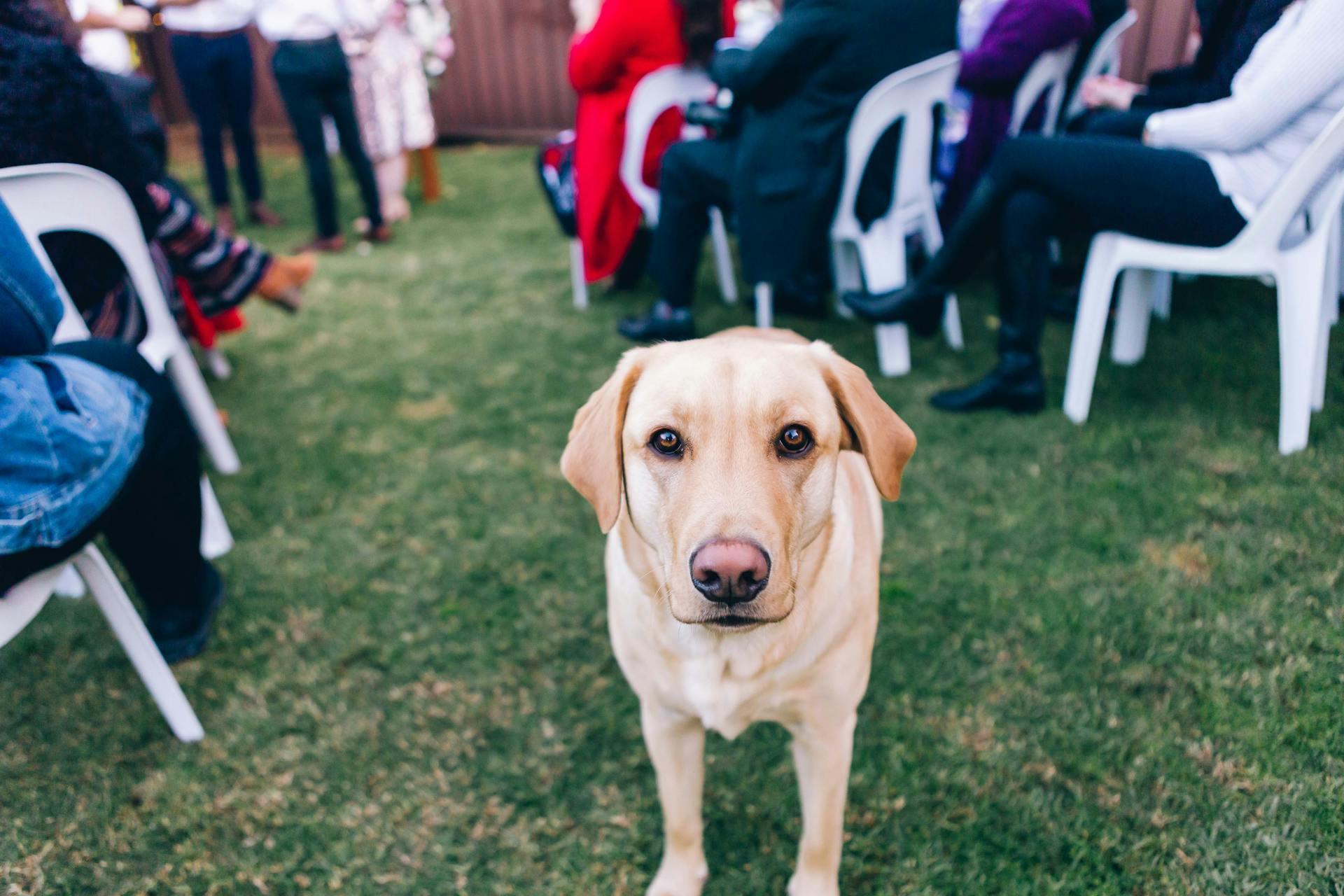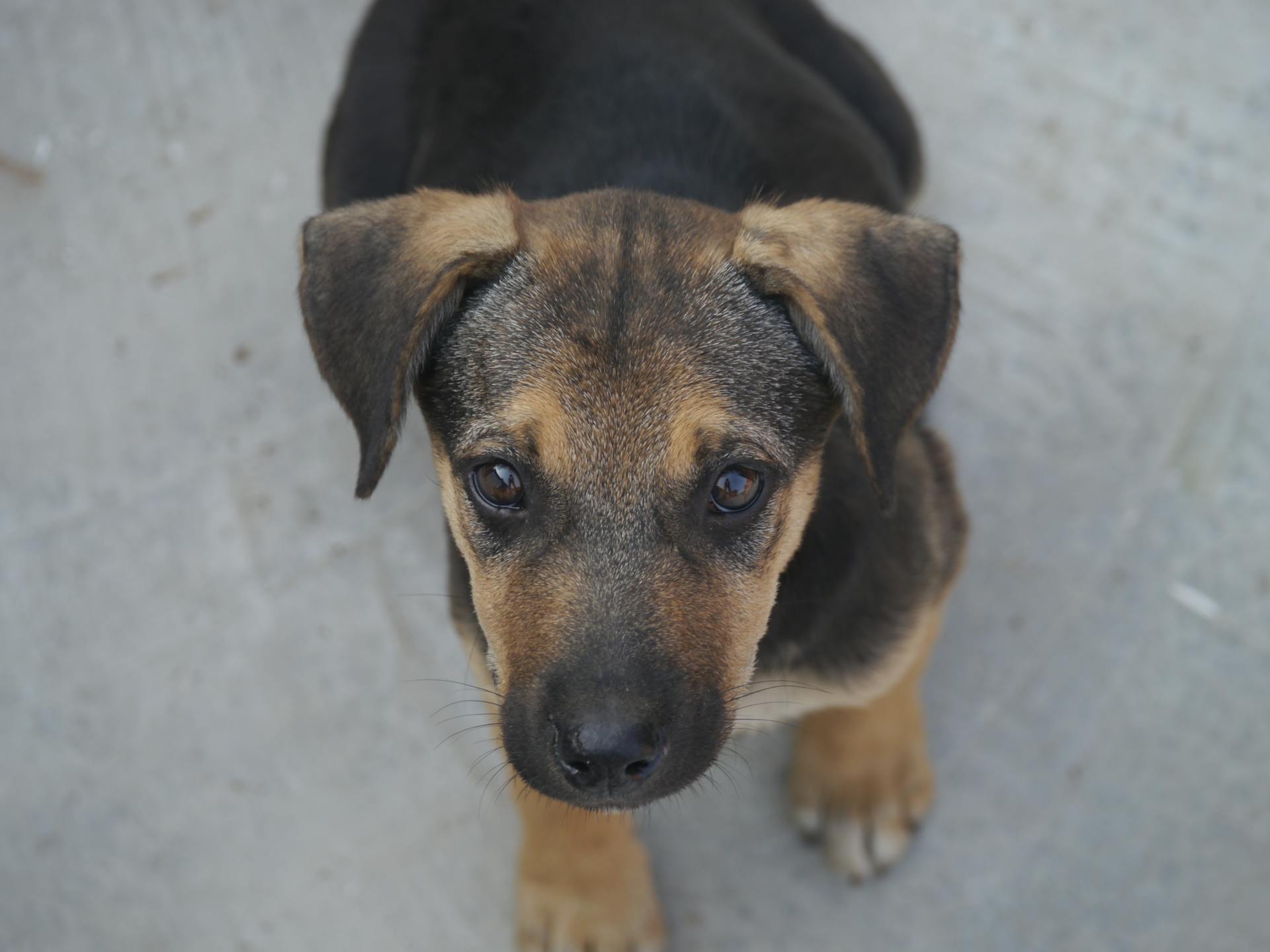
Labradors stop growing at around 12 to 18 months of age, with the average growth rate slowing down significantly around 12 months.
At this stage, they are still maturing physically and may continue to fill out over the next few months.
Labradors typically reach their full height by 12 to 14 months, but their weight may take a bit longer to catch up, often peaking around 18 months.
Their growth plates, which are responsible for their growth, usually close by 18 months, marking the end of their growth period.
From Tiny to Titan
Labradors grow rapidly during their first year, but their growth slows down significantly after 6 months. By 12 weeks, your lab puppy is about 25 pounds, give or take a few pounds.
Their size will change dramatically as they grow, and it's not uncommon to see them transform from a tiny tangle of fur to a hefty heap of fur in a short amount of time. By one-year-old, your Labrador pup will have reached their peak in terms of height.
For your interest: Do Labradors Have Hair or Fur
Most breeders agree that your Lab will stop growing at some point during their second year, with many experts suggesting they reach full maturity around 18 months. However, some puppies mature mentally and physically quicker than others.
Labradors typically reach their full weight by 18 months, but any weight gain during their second year will be minimal. By 9 to 12 months, they should have reached their full height, with most experts feeling it is safe for them to begin long runs and activities involving jumping without damaging their joints.
It's estimated that in the UK, the average height at the shoulders of a male Lab is around an inch taller than the breed standard. This is a good reminder that every dog is unique, and there's no one-size-fits-all growth chart for this breed.
A unique perspective: When Do Mixed Breed Dogs Stop Growing
Adult
As your Labrador grows into adulthood, you can expect them to reach their full height between one to two years old. A female Lab typically stands at a proud height of 21.5–23.5 inches tall, while a male Lab is often slightly taller, at 22.5–24.5 inches.
Their adult height is just one aspect of their growth, as they continue to fill out and become the robust playful pooch they're meant to be at about two years old. This is due to their diet, amount of daily exercise, genetic makeup, and gender.
Let's take a look at the average adult Labrador retriever's weight. A female lab usually weighs approximately 55–70 pounds, while a male lab weighs around 65–80 pounds due to their slightly larger height and frame.
Here's a quick comparison of the average adult Lab's height and weight:
- Female Lab: 21.5–23.5 inches tall, 55–70 pounds
- Male Lab: 22.5–24.5 inches tall, 65–80 pounds
Labrador Growth Timeline
Labradors typically reach full height by 9 to 12 months, and full weight by 18 months.
Small breeds can be fully grown by 9 months old, while giant breeds can take up to three years to reach full size.
After 6 months, Lab puppies gain weight much less rapidly, but may continue to fill out for up to a year or so.
4-6 Months
At 4-6 months, your Lab puppy is still growing rapidly, but the rate of weight gain slows down significantly after their 6 month birthday.
Males will likely weigh in the high 70s to low 80s, while females will be in the mid-70s.
After 6 months, your Lab will likely gain a little height, and probably continue to fill out for up to a year or so.
A Lab who's petite at 6 months is likely to be petite all her life, so you don't need to worry if your puppy is smaller than others.
Your Lab will stop getting any taller around 6 months, which is when their bones stop growing, and it's safe for them to begin long runs and activities involving jumping without damaging their joints.
Just keep in mind that your dog's height might not match the breed standard exactly, as the average height of a male Lab in the UK is around an inch taller than the standard.
A fresh viewpoint: Why Are Labradors so Friendly
12-Month-Old
At 12 months old, your Labrador is pretty much fully grown and well on their way into adulthood. They may still gain weight and muscle mass but much slower than during the past few months.
They will still display puppy characteristics and even test boundaries, but all in all, they should be obedient and well-trained by now.
Your Labrador will have a ton of energy and still enjoy playtimes and loads of exercise.
They will have reached their full height at this age, but some Labs may appear lanky and still need to fill out in the coming months.
Do Labradors Stop Growing?
Labradors can take up to a year to reach their full size, depending on their bone structure.
Most Labradors will be at full height and weight by their first birthday, but some may take a bit longer. Generally, you can expect your Lab to be quite close to their final adult height at around nine months of age.
Labradors will stop growing during their second year, but much of their growth will be completed before they reach one year old. In fact, they will have done the majority of their growth by their first birthday.
You can get an idea of how big your Lab may grow by examining the size of their paws, especially when they're a puppy. This is because Labs need to fill out more than smaller breeds as they are medium to large-sized dogs.
Labradors will have reached their full weight by 18 months and full height by 9 to 12 months, but this can vary depending on the individual dog. Most breeders agree that Labradors will stop growing at some point during their second year.
By their first year, your Lab should be mentally out of the puppyhood phase of testing boundaries and disobedience, if you've been consistent in training them. This means they should be friendly, obedient, and well-behaved from their first birthday and into adulthood.
Labs that are petite at 6 months are likely to be petite all their life, so you don't need to worry that they'll grow into a larger dog. After 6 months, Labradors gain weight much less rapidly, and you can expect them to gain a little height and continue to fill out for up to a year or so.
Curious to learn more? Check out: British Labradors Vs. American Labs
Labrador Care and Health
Labradors may be prone to obesity, which can lead to serious health issues like heart and liver disease, skeletal problems, joint inflammation, and arthritis. Regular exercise is crucial to maintaining a healthy weight.
A good starting point for exercise is to provide your lab with stimulating activities, such as long walks or playtime in the yard. This will help burn off excess energy and keep them active.
To ensure your lab is getting the right amount of food, monitor their intake and adjust as needed. This means feeding them the right amount of food at every stage of life, from puppyhood to adulthood.
For your interest: Good Food for Labradors
Lab Care
Lab care is a top priority for any Labrador owner. Your furry friend's health and well-being depend on it.
To keep your Lab at a healthy weight, it's essential to monitor their food intake and stimulate their exercises. Labs are prone to obesity, which can lead to heart and liver disease, skeletal problems, joint inflammation, and arthritis.
A Labrador puppy typically weighs around two pounds for each week of age. By three months, a puppy might weigh 25lbs, and by six months, they'll reach 50lbs.
Labs need to fill out more than smaller breeds as they are medium to large-sized dogs. They can take up to one year before reaching their full size, depending on the individual dog's bone structure.
Adult Lab weight varies, but here are some averages: female Labradors typically weigh 55-75lbs and stand 21-22 inches high at the shoulder, while male Labradors weigh 65-85lbs and stand 22-23 inches at the shoulder.
To track your puppy's growth, use a Labrador growth chart and monitor their weight gain. A good rule of thumb is that your puppy should gain two pounds per week up to six months old, and then transition to about 1 ½ pounds per week until it turns a year old.
Here's a rough estimate of your puppy's weight at different stages:
- 10-15lbs (Weight at 6 weeks old)
- 25lbs (Weight at 3 months old)
- 50lbs (Weight at 6 months old)
- Mid-70s to low-80s (Weight of adult males)
- Mid-70s (Weight of adult females)
Female Cycles
Female Labradors grow at a rapid pace, and it's essential to monitor their weight and height to ensure they're developing healthily.
At 8 weeks, a female Labrador typically weighs between 8-12 pounds and stands 7-10 inches tall. As they grow, their weight and height will increase significantly.
By 3 months, a female Labrador will weigh between 20-26 pounds and reach a height of 10-14 inches. This is a critical period for growth, and owners should provide a balanced diet to support their puppy's development.
Here's a rough estimate of a female Labrador's growth milestones:
Keep in mind that these are general guidelines, and individual Labradors may grow at different rates. Regular check-ups with a veterinarian will help ensure your puppy is on track for a healthy and happy life.
Labrador Size and Sex
Adult Labradors typically reach a weight of 55-75lbs for females and 65-85lbs for males, with a height range of 21-23 inches for females and 22-24 inches for males.
Males are generally larger than females, with a more muscular build.
A female Labrador Retriever typically reaches a height of 21 inches and weighs between 45 to 60 pounds after 12 months.
At maturity, a full-grown female reaches an average of about 22-inch measurements.
Here's a breakdown of the average weights and heights for Labrador Retrievers at different ages:
Keep in mind that these are just averages, and individual Labradors can vary depending on their genetics, diet, and exercise level.
Frequently Asked Questions
What months do labs grow the most?
Labradors experience rapid growth between 6-14 months, during which they can appear lanky before filling out. Growth plates typically close between 12-16 months, but excessive exercise should be avoided until then.
What age do chocolate labs calm down?
Chocolate labs typically calm down between 2-4 years of age, with some individuals maturing earlier or later than others. Mental maturation during this period is a normal part of a lab's development, but individual results may vary.
How much more will my Lab grow after 6 months?
After 6 months, your Lab puppy will continue to gain weight at a slower rate, typically around 1 ½ pounds per week, until it reaches its adult weight between 1-2 years old
Sources
- https://post.bark.co/breeds/how-big-do-labs-get/
- https://www.petinsurancereview.com/blog/labrador-retriever-weight-and-growth-chart-male-female-and-puppy-growing-patterns
- https://www.thelabradorsite.com/labrador-puppy-growth-faq/
- https://www.hepper.com/labrador-weight-chart/
- https://www.snowypineswhitelabs.com/blog/lab-growth-chart-infographic/
Featured Images: pexels.com


